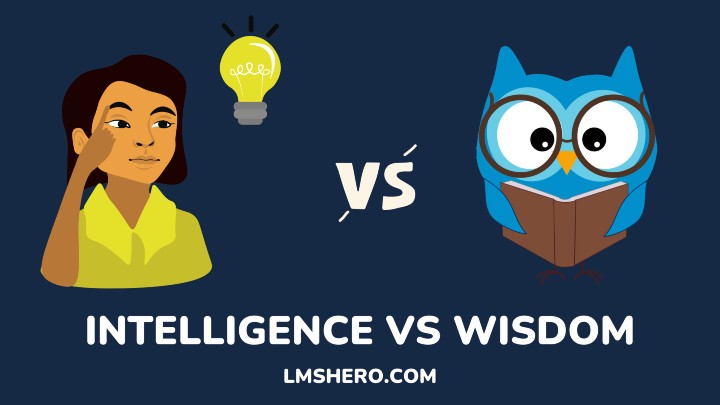Wisdom and intelligence although sometimes used interchangeably do not actually mean the same thing.
Understanding the differences between these unique human characteristics will help prevent you from mistaking them for one another. For one, you can be intelligent but lacking in wisdom.
This article explores the differences between intelligence and wisdom, what it means to have them and how they are acquired.
What is intelligence?
You can simply define intelligence as the capacity to learn and apply knowledge and skills.

Intelligence has been characterized in a variety of ways, including the capacity for logic, emotional knowledge, critical thinking, understanding, and problem-solving. It also entails your capacity to learn, reason, plan ahead, be creative, and be self-aware among other traits.
You can also define it as the capacity to notice or understand information and store it as knowledge to be used for contextualized or environment-appropriate adaptive behaviors.
What is wisdom?
You can define wisdom as the capacity to make sound judgments and decisions by applying your knowledge and experience.
Wisdom can also be defined as the attribute of being wise; the quality of possessing knowledge, experience, and sound judgment. Cleverness, discernment, or insight are terms used to describe the character or state of wisdom.
Typically put wisdom is the knowledge of what is true or right combined with just judgment to act upon.
What is the difference between intelligence and wisdom?
The ability to solve problems and get factual information is a sign of intelligence while wisdom is the capacity to apply knowledge to make wise or rational decisions.
A simple analogy of their difference is that while having the tools amounts to intelligence, the proper choice of the tools to fix a broken wall is wisdom. Hence, wisdom is the proper use of intelligence.
When you strategically combine your experience, knowledge, and intrinsic ability to solve issues, you have intelligence. However, your ability to concentrate on issues, discern the truth, and create a just solution that will showcase your intelligence is an indication of wisdom.
Wisdom also entails ethical sensitivity and awareness of one’s own capabilities. Therefore you can term intelligence as the technical aspect while wisdom offers practicality.
Furthermore, just because someone is intelligent does not automatically make them wise. However, over a long time, intelligence has the capacity to develop into wisdom.
The primary distinction between intelligence and wisdom is that whereas intelligence is a simple concept that only requires basic knowledge, wisdom is a complicated concept that just requires a higher level of comprehension.
Unlike intelligence, wisdom requires a longer period of information accumulation and experience.
What are the similarities between intelligence and wisdom?
One major similarity between wisdom and intelligence is that they both involve gathering, combining, and utilizing knowledge.
Other similarities between wisdom and intelligence include;
- Both have an impact on how you interact with your immediate physical environment.
- Even though they are separate concepts, they coexist.
- Both wisdom and intelligence are seen as desirable brain-related traits.
Is intelligence inherited or developed?
An intricate characteristic, intelligence is determined by both genetic and environmental influences.
There are numerous genes involved, but they all contribute very little to an individual’s level of intellect. Memory and verbal proficiency are two additional aspects of intelligence that are influenced by genetics.
The environment also has a significant impact on intelligence. During a child’s development, a child’s living situation and parenting, schooling, and the availability of learning tools, as well as their health and nutrition, all affect that child’s intelligence.
It can be difficult to disentangle the impacts of an individual’s environment from their genetics on intelligence because of how they both interact.
For instance, if the intelligence of the individual is comparable to that of their parents. This likeness may result from environmental similarities, genetic traits passed down from parents to children, or most likely a combination of both.
However, it is evident that both hereditary and environmental variables influence IQ.
Do you acquire wisdom from birth or learn it?
One can only gain wisdom via experience; it is not an innate characteristic. Anyone who enjoys exploring new experiences and reflecting on them has the potential to become wise.
Being wise cannot be inherited or guaranteed by birth. Every person must cultivate the inner qualities that allow them to be open to learning from new experiences and developing wisdom after birth.
FAQs
Is wisdom better than intelligence?
While they are separate qualities with their advantages, wisdom offers more advantages than intelligence. For example, being intelligent is knowing that you can use a screw to fasten things together.
Why is wisdom important?
By balancing your needs and boundaries with those of others, wisdom enables you to improve your contributions to your community. You consider also both your short-term needs and your long-term goals when you make wise judgments.
How do you develop wisdom?
You can develop wisdom by gathering experience and knowledge, observing others, and reflecting on acquired knowledge. It takes years of experience to become wise; it is not something you can learn by reading a book overnight.
Conclusion
You can sum up intelligence as possessing critical thinking skills, emotional intellect, problem-solving skills, understanding, and the capacity to learn. However, wisdom is the combination of intelligence with experience to make right or just decisions.
This means that if you are intelligent but incapable of utilizing experience from reflecting on your interactions with others, you may not attain wisdom.
Developing wisdom entails that you reflect on the knowledge or experience gathered and use them to make rational decisions.
So while you can acquire intelligence even from birth or build up on it due to environmental factors, wisdom is something you will have to develop with a lot of time.
I hope you found this article helpful. You can also read about why knowledge is power and how to can properly acquire knowledge.
Thanks for reading.






